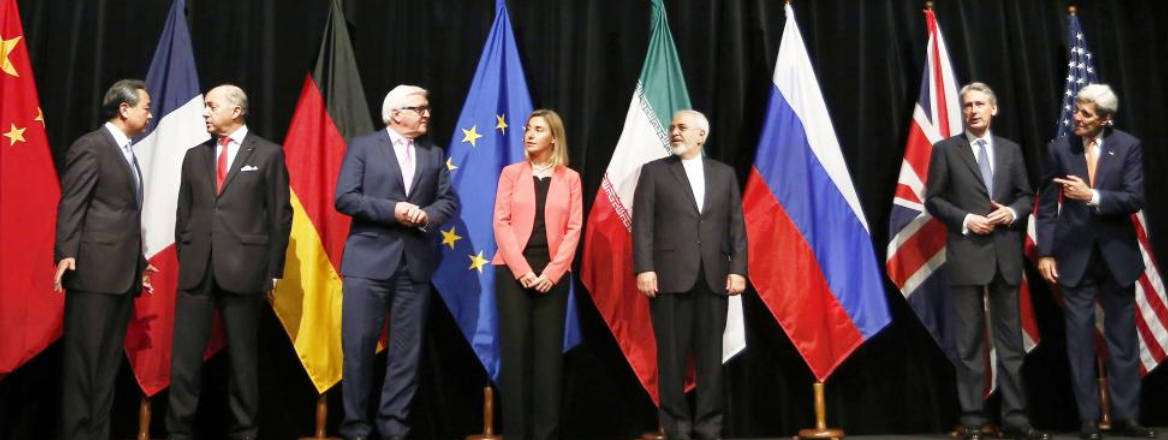An Angry Tehran Cautious after Trump’s Iran Nuclear Speech
For the moment, Iran is biding its time in response to US President Donald Trump’s decision to decertify its nuclear deal with key governments. But Tehran’s patience won’t last long.
US President Donald Trump has now revealed his new strategy on Iran.
Washington’s aim is to take a number of additional steps to ensure that Iran never acquires a nuclear weapon, as well as to address the country’s non-nuclear related activities, perceived as threatening the US and its allies in the region.
In his speech last week, Trump once again described the nuclear deal announced in July 2015 (and known as the Joint Comprehensive Plan of Action, JCPOA) as the ‘worst’ and most one-sided agreement ‘ever’ and claimed that the sanctions on Iran were wrongly lifted at a time when the country was ‘on the verge of collapse’.
Trump added that the agreement was supposed to contribute to regional and international peace and security, but that Iran had not lived up to the spirit of the deal.
In line with expectations, he thus refused to certify that Iran remains in compliance with the deal, arguing that the suspension of US sanctions, entailed in the agreement, was not proportionate to the measures taken by Tehran on the nuclear front.
By doing so, Trump deferred presidential powers to Congress, which will now have 60 days to either reimpose sanctions waived under JCPOA or to unilaterally amend the provisions of the multilateral deal, adding conditions under which sanctions would automatically snap back.
Trump claimed that if no agreement is reached between Congress and the administration on a revised version of the deal, the US will then withdraw from the JCPOA. Legislation has already been prepared by Senators Tom Cotton and Bob Corker with the aim of addressing the perceived flaws of the deal. These include a provision under which US sanctions against Iran would be automatically re-instituted, in case the ‘breakout time’ comes within a year.
This would most likely be perceived in Tehran and in the other countries committed to the agreement as a violation of JCPOA’s terms.
The strategy also highlighted the need to curb Iran’s behaviour in the region, focusing in particular on restricting the funding and activities of the Islamic Revolutionary Guard Corps (IRGC) and the testing of ballistic missiles.
To this end, sanctions were imposed on the entire IRGC, accused of hijacking large portions of the Iranian economy and of controlling weapons and missiles targeting civilians.
The response of the Iranian leadership to Trump’s speech and decisions has been scathing but cautious. Agreeing with EU High Representative Federica Mogherini, President Hassan Rouhani claimed that no president has the power to revoke unilaterally an international document backed by the UN Security Council, adding that the Iranian nation will never submit to a dictator's will.
Rouhani also said that, in spite of the decertification, and as long as the other signatories to the agreement (in particular European members) remain committed to the accord, Iran will uphold it and continue working with the International Atomic Energy Agency.
Tehran’s decision on JCPOA will ultimately be influenced by what Congress decides on 14 December, but also on the political and economic steps the other signatories take to ensure that the deal continues to be in Iran’s national interests, should the US withdraw from it.
While on the nuclear issue Iran is thus adopting a wait-and-see strategy characterised by a measured response, the same cannot be said about the reaction to the accusations raised towards the IRGC.
Trump refrained from designating the IRGC, a branch of the government, as a terrorist group, a measure which would have likely been considered as a declaration of war in Tehran and would have led to retaliatory measures against the US military.
Trump’s more guarded words, however, have still triggered an unprecedented wave of support for the IRGC, across Iran's political spectrum.
Foreign Minister Javad Zarif, for instance, tweeted: ‘Today, Iranians--boys, girls, men, women--are ALL IRGC; standing firm with those who defend us & the region against aggression & terror’.
Even Rouhani, who until a few months ago was openly criticising the Corps for their influence in the Iranian economy and its politics, has now praised them for their role in combating terrorism in the region.
He said: ‘Any action by the US administration or Congress against the IRGC will constitute a strategic mistake and will draw the indignation of the Iranian people and a strong and unified reciprocal reaction’.
By uniting hardliners and moderates behind the IRGC, the unintended consequence of Trump’s speech might be a shift towards retaliation, generally advanced by hardliners, rather than engagement in response to outside pressure.
So, besides triggering the potential collapse of the nuclear deal, that could lead to a further escalation of tensions in the Middle East, which is just what the region does not need right now.
The views expressed in this Commentary are the author's, and do not reflect those of RUSI or any other institution.
WRITTEN BY
Dr Aniseh Bassiri Tabrizi
External Author


